 The importance of deep seabed minerals as a new major economic resource to island states in the Pacific has been reinforced with the appointment of Ms. Hannah Lily - Legal Advisor Deep Sea Minerals Project.
The importance of deep seabed minerals as a new major economic resource to island states in the Pacific has been reinforced with the appointment of Ms. Hannah Lily - Legal Advisor Deep Sea Minerals Project.
Ms. Lily is the first lawyer to be employed by the SOPAC Division of SPC (Secretariat of the Pacific Community). Ms. Lily was speaking during the First SPC/SOPAC Division Meeting held in Nadi from October 19 - 22.
Ms. Lily said that the purpose of the project is to support 15 participating member countries in developing a legal framework to allow for deep-sea mineral exploration and mining.
Presently there is little legislation in place specifically to govern deep seabed mining. The world’s first seabed mining activities are set to begin operations in late 2013 in Papua New Guinea waters.
The Canadian company, Nautilus Minerals, is expected to begin mining Seafloor Massive Sulphide deposits at 1500 metre water depth off of the coast of New Ireland, Papua New Guinea - the first deep sea mineral mine in the world.
Both Tonga and Nauru are pursuing exploration licenses in international waters in the east Pacific through their sponsorship of companies, Tonga Offshore Mining Limited (Tonga) and Nauru Offshore Resources Inc. (Nauru).
SOPAC, with the appointment of its first lawyer, now stands ready to assist Pacific Island countries to develop their policy and laws “to regulate these exciting new opportunities.”
“We are working with Papua New Guinea and providing advice on legal documents as they move towards finalizing their legislation on sea bed mining, as well as working with Nauru, Tonga, and other island countries that are considering applying to the International Seabed Authority for the granting exploratory licenses.”
A major reason for the project, she said, was that mining companies as well as many environmental groups interested in seabed mining have highly qualified lawyers, but Pacific Island governments, while having their own excellent legal departments, have limited experience in this high technical specialized area of regulatory law.
Countries participating in this EU funded Project are the Cook Islands, Federated States of Micronesia, Fiji, Kiribati, Marshall Islands, Nauru, Niue, Palau, Papua New Guinea, Samoa, Solomon Islands, Timor Leste, Tonga, Tuvalu and Vanuatu.
“It is our intention to help the participating countries have robust legislation in place that effectively regulates and monitors deep sea mineral mining, that protects them from any damage that may occur, but at the same time facilitates mining as a new revenue stream.
“This is an emerging industry, and Pacific Island states are leading the way. SOPAC is delighted, with the EU’s support, to be able to assist them in these exciting endeavors.”
Hannah Lily, who has been with SOPAC for two months, is a solicitor from London with extensive experience in regulatory law with the British Government. She has also worked for the United Nations, the private sector and non-governmental organization.
Caption: Ms. Hannah Lily





